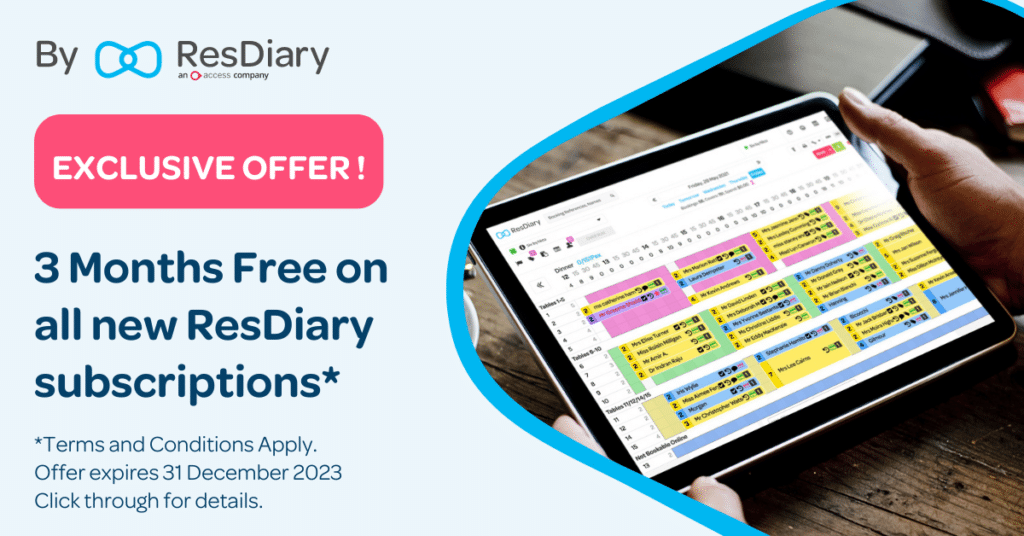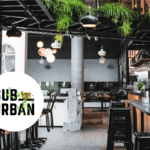Share Post
FoodByUs takes a look at how restaurant booking systems make it easy to generate more covers, simplify table planning, prevent no-shows, and leverage your diner data to delight customers.
The hospitality industry is undergoing rapid digital transformation, with technology enabling operators to drive revenue and productivity, while also delivering better customer experiences.
One of the key tools in the hospo tech stack is restaurant booking systems, with sophisticated ones providing solutions for a wide range of business challenges beyond taking bookings.
In this article, we outline four of the key benefits these tools offer.
1. Drive More Bookings
In Australia, online bookings through a restaurant booking system now account for up to 30.1 per cent of all restaurant bookings, according to 2022 booking data analysis by ResDiary, a global restaurant reservations platform.
Many diners prefer to book online, which represents a significant lost opportunity if you are a venue taking bookings manually, according to ResDiary Growth Manager, Tom Haynes.
“It is quite easy to add a branded booking widget to your website, Facebook, Instagram reservation buttons, and Google My Business listing, and set up ResPhone so people can book by telephone during busy periods,” Haynes said.
However, taking the booking is only the start. It can then be automatically assigned a table to maximise venue capacity, made visible to your team for roster planning, and automated customer reminders sent to reduce no shows.
2. Stop No Shows:
No-shows are a costly frustration for restauranteurs, however ResDiary data shows that they are on the decline, largely due to restaurants taking deposits, and booking systems that enable automated reminders which make it easy for diners to cancel their reservation.
“While a cancellation is obviously not desired, it is better than a no-show because at least you have an opportunity to offer that table to another diner,” Haynes said.
Taking credit deposits during the booking process – whether online, over the phone, or in person – is also an increasingly popular and powerful tool to eliminate now-shows.
“You can customise the rules to suit your venue, and most venues only require a deposit for larger bookings on busy days. Card details are stored and handled by our compliant payment partner, Stripe, and saved with other customer data for return visits.”
3. Use Data to Drive Return Customers
Owning your diner data is one of the most important aspects of choosing a restaurant booking system, according to Haynes.
This diner data can then be used to drive return customers, through promotions for diners who haven’t visited in a while, birthday or anniversary offers, event invites, or personalised communications around previous dining history.
“Be aware that some restaurant booking systems will retain the data from your diners to send emails promoting other restaurants on their platform. For me that is a red flag,” he said, adding that flat-fee booking systems are also preferable to those charging a commission per cover, to prevent bill shock.
Furthermore, knowing your customer’s taste preferences and spending habits – captured by connecting your booking and EPOS systems – can also enable you to create unforgettable, personalised dining experiences.
This data makes it easy for all staff to easily identify your customer’s favourite bottle of wine, their preferred table, or if it is a special occasion such as a birthday or anniversary.”
4. Easy Table Planning
Every venue operator will know that table planning can be seriously stressful, especially on busy days like Mother’s Day, Valentine’s Day, and during the Christmas party season.
You want to maximise your capacity without overcrowding, and stagger bookings to minimise the kitchen being overloaded, while also managing walk-ins, cancellations and no-shows.
This is where a sophisticated and customisable restaurant booking system like ResDiary can help you maximise your available space, while still ensuring a smooth service, according to Haynes.
“You can create a digital table plan and set rules for how many customers you can sit at once, and available booking times. Once you have set the rules, ResDiary does the rest by automatically managing the available slots people can book online, assigning bookings to tables, and even linking tables for larger parties.”
Disclaimer: This guide is general in nature and does not take into account your individual circumstances. Before acting on any information, you should consider whether this is right for your business.
Share Post






